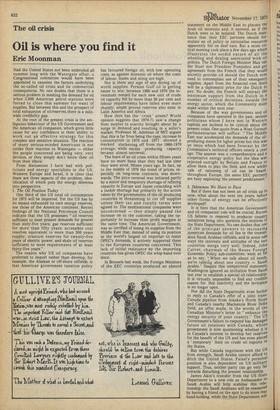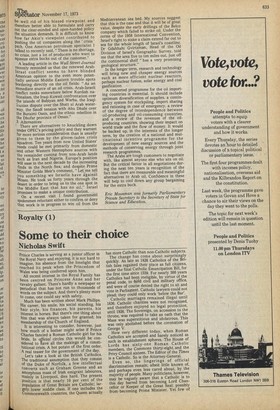The oil crisis
Oil is where you find it
Eric Moonman
Had the United States not been embroiled alt summer long with the Watergate affair, a Congressional committee would have been appointed to examine the factors underlying the so-called oil crisis and its commercial consequences. No one doubts that there is a serious problem in meeting the demand foroil when 2,000 American petrol stations were forced to close this summer for want of supplies. But between this and the prospect of total exhaustion of oil reserves,there is a milewide credibility gap. At the root of the present crisis is the ambiguous behaviour of the US Government and the American oil companies, which gives little cause for any confidence in their ability to work out an effective strategy for this
complex and sensitive situation. The reaction
of many serious-minded Americans is not unlike their reaction to Watergate — either the people concerned are being very, very devious, or they simply don't know their oil from their elbow. From discussions I have had with politicians and energy specialists in the US, Western Europe and Israel, it is clear that there are three aspects of the problem, identification of which puts the energy dilemma into perspective.
1. TheOil Position Today One third of the US total oil consumption, for 1973 will be imported. Yet the US has by
no means exhausted its own energy reserves, nor those of the American continent. Recent findings of the National Petroleum Council
indicate that the US possesses " oil reserves
sufficient to meet present demands for greater than sixty-five years; gas reserves sufficient for more than fifty years; accessible coal reserves equivalent to more than 300 years supply; uranium reserves for twenty-five years of electric power; and shale oil reserves sufficient to meet requirements of at least thirty-five years." The reason why US oil companies havepreferred
to import rather than develop,for example, the Alaskan or off-shore oilfields, is that American government taxation policy
has favoured foreign oil, with low operating costs, as against domestic oil where the costs of labour, leases and siting are high. Nor is there any sign of any drying up of world supplies. Persian Gulf oil is getting easier to win; between 1960 and 1970 the investment needed for each new unit of crude oil capacity fell by more than 50 per cent and labour requirements have fallen even more sharply; ample proved reserves also exist in Latin America and Africa. How then has the ' crisis ' arisen? World opinion suggests that 1970-71 saw a change from surplus to scarcity brought about by a surge in demand and resulting in a seller's market. Professor M. Adelman of MIT argues that this is far from being the case; increase in consumption in 1970 and 1971 showed a marked slackening off from the 1960-1970 average, while excess producing capacity became almost universal. The fears of an oil crisis within fifteen years have no more basis than they had last time they were aired, fifteen years ago. In fact, up to the middle of 1970 the trend of prices, especially on long-term contracts, was downwards. The price reversal was initiated partly by a minor and temporary shortage of refining capacity in Europe and Japan coinciding with a tanker shortage but primarily by the action taken by the governments of the oil producing countries in threatening to cut off supplies unless their tax and royalty terms were agreed to. The multinational companies were unconcerned — they simply passed the increase on to the customer, taking the opportunity to increase their profit margins at the same time. The American Government, was so terrified of losing its supplies from the Middle East that, instead of using its position as the world's largest oil importer to resist OPEC's demands, it actively supported them to the European countries concerned. This lack of initial resistance by the importing countries has given OPEC the whip-hand ever since. In Brussels last week, the Foreign Ministers of the EEC countries produced an absurd statement on the Middle East to placate the Arab oil interests and, it seemed, as if the Dutch were to be isolated. The Dutch insistence that their EEC partners should formulate an oil policy or rationalise resources apparently fell on deaf eatical meeting took place a few days ago which illustrates the sordid nature of all the wheeling and dealing associated with oil politics. The Dutch Foreign Minister Max van der Stoel met President Pompidou and got agreement from the French that they would secretly provide oil should the Dutch ever need to contemplate use of their emergency supplies. Apart from the financial cost there
m
will be a diplomatic price for the Dutch to pay. No doubt the French will extract the maximum support from the Dutch in a number of critical decisions, outside the energy sector, which the Community must make within the next year. Because of the way governments and oil companies have operated in the past, serious politicians whom I have met in Western capitals are inclined to be cynical about the present crisis. One quote from a West German parliamentarian will suffice: "The Middle East war accelerated the demands of the oil producing states for hgher prices but this was an issue which had been forecast by the commission's technical officers nearly a year ago. The answer was a comprehensive and a cooperative energy policy but the-idea was rejected outright by Britain and France to
w
allow them to play the field, and no whilst talk of rationing of oil can be heard throughout Europe, the same EEC partners are busy exploiting the present predicament." 2. Dilemmas We Have to Face But if there has not been an oil crisis up to now, what about the next ten years, before other forms of energy can be effectivelY developed? It is here that the American Government and oil companies' role will be crucial. Recent US failures to respond to producer countrY, initiatives bring into question the motives ei the State Department. No. one doubts that one of the principal answers to increasing American demands for oil lies in the tremendous Saudi Arabian oilfields, and in some odd ways the interests and attitudes of the two countries merge very well. Indeed, John Culver, chairman of the House Foreign Economic Policy sub-committee, went so tar as to say, "When we talk about oil need5. we're talking about one country — Saudi Arabia." Despite this unequivocal statement, Washington ignored an invitation from Saudi last year to establish a special oil relationshiP. It is virtually impossible to find any credible reason for this inactivity and the invitation is no longer open. Nor did the State Department even bother to reply to Canada's offer of a joint trans. Canada pipeline from Alaska's North Slope and Canada's nearby Mackenzie River Delta field, an offer made, in the words of the Canadian Minister's letter to " enhance the energy security Of your country." The US Government's failure to respond has damaged future oil relations with Canada, whose government is now questioning whether it is in Canada's interest to develop her reserves for the benefit of the US and has even placed a ' temporary ' limit on crude oil exports to the States. But while Canada negotiates with the US from strength, Saudi Arabia cannot afford to ditch the United States. Faisal's personal position is also dependent on US military support. Thus, neither party can go very far towards disturbing the present relationship. James Akin's transfer from the US State Department to a new role as Ambassador to Saudi Arabia will help stabilise this relationship: the Saudi Arabians will be reassured by having a friend on the spot to do some real hand-holding, while the State Department Will
be well rid of his biased viewpoint and therefore better able to formulate and carry out the clear-minded and open-handed policy the situation demands. It is difficult to know how far Akin's viewpoint contributed to Pushing the oil companies along the ' crisis ' Path. One American petroleum specialist I talked to recently said, "There is no shortage, no crisis, just a lot of producers who want to Squeeze extra bucks out of the customer."
A -leading article in the Wall Street Journal recently reminded us that the renewed ArabIsrael conflict seems to have blinded American opinion to the even more potentially serious Middle Eastern trouble spots bordering directly on the oil fields: "As an Immediate source of an oil crisis, Arab-Israeli conflict ranks somewhere below Kurdish nationalism, the Iraqi-Kuwait confrontation over the islands of Babiyan and Warba, the Iraqi"Italian dispute over the Shatt al Arab waterway, the Saudi tension with Abu Dhabi over the Buraimi Oasis, and the ethnic rebellion in the Dhofar province of Oman."
,3. Alternatives
There are alternatives to knuckling down under OPEC's pricing policy and they warrant far more serious consideration than is usually. given to them by the gloom-laden crisis Squadron. Ten years from now United States' needs could be met primarily from domestic ,and other Western Hemisphere sources with the remainder coming from non-Arab lands such as Iran and Nigeria. Europe's position Will ease in the next decade by the increasing finds in the North Sea; and despite Prime Minister Golda Meir's comment, "Let me tell You something we Israelis have against Moses. He took us forty years through the desert in order to bring us to the one spot in the Middle East that has no oil," Israel Promises to make a unique contribution.
On a recent visit I found government spokesmen reluctant either to confirm or deny that work is in progress to win oil from the Mediterranean sea bed. My sources suggest that this is the case and that it will be of great value, despite the early drillings of the Belco company which failed to strike oil. Under the .terms of the 1958 International Convention, Israel's right to stake a claim extend far out to sea for the whole length of Israel's coastline. Dr Gdahhahi Gvirtzman,, Head of the Oil Division of Israel's Geographic Survey, told me that the area five to ten miles out, just off the continental shelf " has a very promising geological structure.." In the longer term, research and technology will bring new and cheaper energy sources such as more efficient nuclear reactors, perhaps nuclear fusion, solar energy and coal gasification.
A concerted programme for the oil importing countries is essential. It should include optimum diversification of supplies, a contingency system for stockpiling, import sharing and rationing-in case of emergency, a review of the degree of interdependence between oil-producing and oil-consuming countries, and a review of the revenues of the oilproducing countries, showing their impact on world trade and the flow of money. It would be backed up, in the interests of the longer term, by the creation of a national and multinational incentive programme for the development of new energy sources and the methods of conserving energy through joint research programmes. The Arabs are tough customers to negotiate with, like almost anyone else who sits on oil. But the critical factor in all negotiations during the next ten years is recognition of the fact that there are measurable and meaningful alternatives to Arab oil. Confidence in these ' will help to cool down any group bargaining for the extra buck.
Eric Moonman was formerly Parliamentary Private Secretary to the Secretary of State for Science and Education.



































 Previous page
Previous page